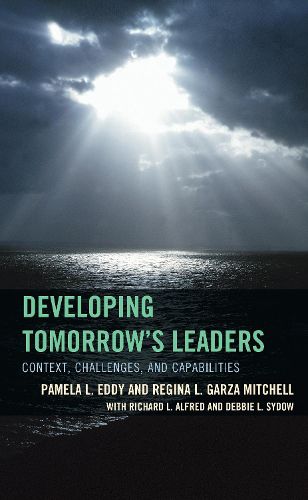Readings Newsletter
Become a Readings Member to make your shopping experience even easier.
Sign in or sign up for free!
You’re not far away from qualifying for FREE standard shipping within Australia
You’ve qualified for FREE standard shipping within Australia
The cart is loading…






The contributions of community colleges to society are well-documented. Yet, today’s community colleges are at a cross road. Decreases in funding support, a push for college completion, attention on developmental course work, and a host of other demands create a dynamic context for community college operations. Who leads these colleges matters as they face these demands and how they lead influences outcomes. Pending leadership retirements provide a prime opportunity for thinking about community college leadership in new ways. Entering this environment are prospective and aspiring leaders who are often not adequately prepared for the complexities of managing in a paradoxical organization. The era of accountability puts a fine point on the need for leaders to pay heed to the policy making process and to requirements dictated by state legislative bodies and accreditation bodies. Foundations and grant funders serve as instigators for changes in community colleges, as well and also support research into ways to link employer needs to college curricular changes. This book argues that neo-leaders are required to lead transformational change for today and tomorrow’s community colleges. No longer can we rely on single leaders atop a hierarchy. Talent throughout the institution must be tapped. The authors argue that networked leadership is needed. For networked leadership, we begin to advance thinking about the role of networks and connections among leaders throughout the college and beyond the college’s walls. This volume outlines underlying values critical for neo-leaders and offers questions leaders at various levels can use to jumpstart the type of courageous conversations needed on campus. The tools presented in this book provide current and aspiring leaders with resources to prepare for successfully leading the way and developing new leaders to shape the future. Our community colleges and their students require nothing less.
$9.00 standard shipping within Australia
FREE standard shipping within Australia for orders over $100.00
Express & International shipping calculated at checkout
The contributions of community colleges to society are well-documented. Yet, today’s community colleges are at a cross road. Decreases in funding support, a push for college completion, attention on developmental course work, and a host of other demands create a dynamic context for community college operations. Who leads these colleges matters as they face these demands and how they lead influences outcomes. Pending leadership retirements provide a prime opportunity for thinking about community college leadership in new ways. Entering this environment are prospective and aspiring leaders who are often not adequately prepared for the complexities of managing in a paradoxical organization. The era of accountability puts a fine point on the need for leaders to pay heed to the policy making process and to requirements dictated by state legislative bodies and accreditation bodies. Foundations and grant funders serve as instigators for changes in community colleges, as well and also support research into ways to link employer needs to college curricular changes. This book argues that neo-leaders are required to lead transformational change for today and tomorrow’s community colleges. No longer can we rely on single leaders atop a hierarchy. Talent throughout the institution must be tapped. The authors argue that networked leadership is needed. For networked leadership, we begin to advance thinking about the role of networks and connections among leaders throughout the college and beyond the college’s walls. This volume outlines underlying values critical for neo-leaders and offers questions leaders at various levels can use to jumpstart the type of courageous conversations needed on campus. The tools presented in this book provide current and aspiring leaders with resources to prepare for successfully leading the way and developing new leaders to shape the future. Our community colleges and their students require nothing less.